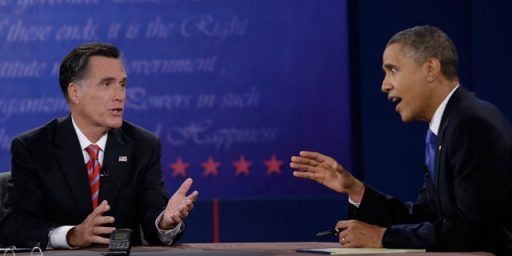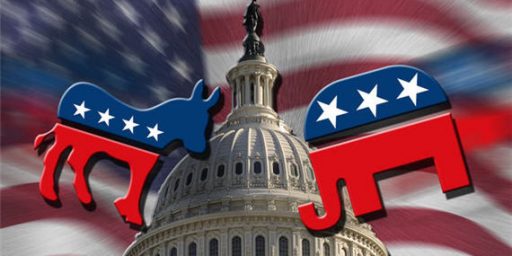Poll: Americans Overwhelmingly Support Obama/GOP Tax Cut Deal
While extremists in both parties are pushing for rejection of the tax cut deal between President Obama and the GOP, a new poll shows that the vast majority of Americans favor it:
About seven in 10 Americans back the tax deal negotiated last week by President Obama and congressional Republicans, according to a new Washington Post-ABC News poll.
The high bipartisan support for the package masks more tepid public approval for some of the main components of the agreement that comes before a key Senate vote this afternoon.
A slender 11 percent of those polled back all four of the deal’s primary tax provisions: an across-the-board extension of Bush-era tax cuts, additional jobless benefits, a payroll tax holiday and a $5 million threshold for inheritance taxes. Just 38 percent support even two of the components.
But put all four items together, and 69 percent of all Americans support the package. Large majorities of Democrats, Republicans and independents alike favor the agreement, which has drawn stiff opposition from some Democrats in the House. In the poll, 69 percent of liberal Democrats support the agreement, which Obama has called a framework for legislation.
Even when primary objections to the pact are mentioned – that it would add about $900 billion to the federal budget deficit and that it extends tax breaks to the wealthy – 62 percent of all those polled support the package.
Broad public support for the agreement comes despite only modest expectations that the tax cuts will help lift the struggling national economy. About twice as many see the deal as making things better than see it hurting the economy over the next year or two (36 vs. 17 percent), but just 9 percent think it will improve things a “great deal.” Nearly half say the tax cuts won’t make much of a difference or express no opinion on the question.
Overall, expectations for the deal are similar to assessments of the effect of the 2009 stimulus. But unlike public opinion on that Democratic initiative, both support for and skepticism about the new tax agreement cross party lines.
In previous polling, many Democrats, but few Republicans, said the stimulus package helped the economy. By contrast, 39 percent of Democrats, 36 percent of independents and 34 percent of Republicans say they think the tax agreement will help the nation’s economy.
The deal faces its first test vote in the Senate today where it is expected to pass. The real test will be in the House of Representatives.






Seems to me that this should be filed under: “don’t let the good be shunned in the name of the perfect.”
The bill is a mess. Hopefully errors can be corrected. But let the tax rates increase and you could be looking at a double dip. That means bigger deficits and higher unemployment. Yes, ethanol subsidies are a travesty. But let’s fix that later. For now, keep the economy at least stable.
I am a moderate and I don’t like it. Surely I am not the only one.
No one likes it John. That is why it is a broadly popular compromise.
What I”m saying is, given poll choices of support somewhat/strongly and oppose somewhat/strongly … it would come down to how hard I want to “oppose” in that moment.
“support” is right out.
Steve Bainbridge asks:
“What do Keith Olbermann, Rachel Maddow, Bernie Sanders, and Barney Frank have in common with Rush Limbaugh, Glenn Beck, Jim DeMint, and Michele Bachman?”
They’re all pissed off at the bill. Which tells me it’s probably not all that bad.
> “don’t let the good be shunned in the name of the perfect.”
Actually, it is a Voltaire quote “the perfect is the enemy of the good”.
The bill is a reasonable compromise, and that is something that has been in very short supply indeed for the last ten years.
“The bill is a reasonable compromise, and that is something that has been in very short supply indeed for the last ten years.”
No, it is not a reasonable compromise.
A reasonable compromise would have charted rates into the future, with a programmed change from “stimulus” to “revenue recovery.”
It would be reasonable, say, to set the top rate as 35% this year, 35.5% then next, 36% the next, and so on. Or, alternately, to leave the top tax rate a 35%, but to scale down the mortgage tax credit by 10% each year for 10 years, until its gone.
There are all kinds of things reasonable adults could do to both stimulate the recovery and plan … recovery. They are the sorts of things we are able to plan in our own lives.
This “compromise” that the foolish are so proud of is not any kind of solution. It simply kicks the can down the road in the most irresponsible way.
Ah, I see that Roubini is in my camp:
As reported at Economist’s View